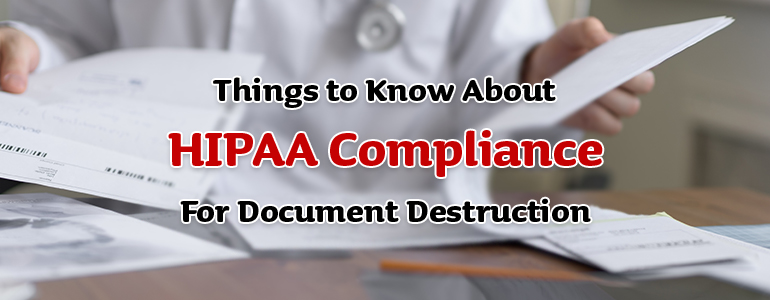A key element in safeguarding sensitive patient data and ensuring broader HIPAA compliance is that of document shredding. As such, shredding is a critical consideration in the overall management of your medical facility. The first reason for this is that full compliance keeps your patients safe, and this in turn engenders a sense of trust in the professional nature of the facility and those who operate it. Second, staying on top of compliance helps you steer clear of costly fines from OSHA that might otherwise be incurred.
Avoiding HIPAA Violations with Document Destruction
The first task is to gain a comprehensive understand of what HIPAA is and how it works within the context of medical facility administration. HIPAA, also known as the Health Insurance Portability and Accountability Act, came into being back in 1996, and it is a legislative framework designed to safeguard the privacy and medical data of all patients. Information of this type is referred to as PHI, or protected health information.
Consequences of HIPAA Violations
When your facility fails to achieve compliance with HIPAA rules, there are a number of ramifications that can vary in relation to the seriousness of the breach, and these can include things such as licensing loss as well as expensive fines.
Furthermore, individual patients whose health information is ultimately compromised or unlawfully disclosed because of your failure to comply has the right to initiate litigation against the facility. This is never an outcome a medical facility operator wants to have happen.
Clearly, there is a lot at stake when it comes to adherence to HIPAA rules, and if you do not educate yourself about exactly what is required, the fallout can be severe indeed.
The Role of Document Destruction in HIPAA Compliance
The idea behind document shredding in the HIPAA context is that every paper document containing patient information will be destroyed to an extent that the data cannot be used by anyone else for any reason. This is a process that is central to achieving compliance with HIPAA, and all medical facilities that generate documentation of this sort must take steps to fully comply.
Prohibited Actions Concerning PHI
Though many medical facilities have migrated their recordkeeping to electronic storage, and PHI resides on servers rather than on paper, it seems almost certain that at least some information will be retained on physical documentation within the facility. As such, all those within the facility who have access to such documents need to be familiar with what is and is not permitted under the law.
First of all, it is forbidden for anyone within the facility to toss this type of documentation in trash cans or outdoor dumpsters. Items of this nature must never be allowed to sit in an office so that they are exposed or accessible to members of the public or staffers who lack authorization to view them. Any drawers or file cabinets that store documents of this sort must always be kept locked.
Reasons to Work with Shred Confidential for Proper Document Destruction
Professional document shredding companies know how to help get your facility into full compliance with HIPAA rules, but the key is to select a firm that possesses vast experience in this realm and is highly-trained on all relevant regulations.
Make certain that any prospective document shredding company is well-versed in all HIPAA protocols, because if they lack detailed information about the law, they may not be trustworthy in terms of ensuring your compliance.
Any company you are considering hiring should also be knowledgeable in a range of different document destruction methods. While pulverizing and pulping are options for paper documents, shredding is known to be a convenient method that still achieves the desired result.
A reputable shredding company is one that will always work hard to keep document destruction costs down. This sometimes requires transporting documentation from the medical facility to an off-site location for the purpose of shredding as well as final disposal.
Top-notch shredding services will also be able to deliver all documentation and proof of destruction practices in the event an OSHA audit is initiated in reference to your facility. Official certificates of document destruction following shredding should be issued as standard practice for this very purpose.
Always bear in mind that as the medical facility operator, you bear responsibility for maintaining the confidentiality of personal health information of patients. Though you may engage the services of a third party vendor to assist with your duties, the liability for compliance still rests with you. This means that extreme care must be used when choosing a company to help with document destruction tasks. Look for a firm that can demonstrate real expertise within the industry, and you will be able to rest assured that your interests are being protected.
The process of selecting a document destruction company is not one to be taken lightly. The ramifications of making a bad decision in this realm can be extremely harmful to a medical facility and may last for years. Due diligence is required in order to find a firm with a track record of successful work on behalf of similarly-situated entities. Fortunately, with a bit of legwork, it is possible to find the help you need with this most vital of administrative tasks.
If you are interested in learning more about an array of available document shredding options and the ways in which your facility can achieve full legal compliance, get in touch with the professionals at Shred Confidential, a full-service shredding enterprise located in Southern California.

